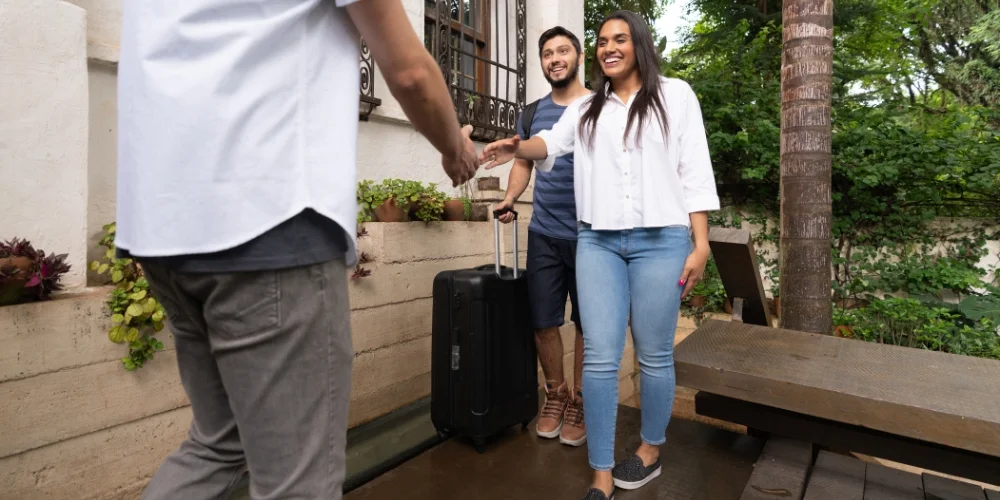As we near the end of 2023, you might have noticed some big ripples of change spanning the Australian hotel market. Big brands are of course still powerful, but many are starting to feel strain – simply put, their speed of growth is exceeding their ability to succeed with the necessary support for all of their booming properties.
Ask any of us here at Axsia HTL whether traditional hotel management agreements (HMAs) are still appropriate to cater to the current hospitality climate, and you’ll get a quick and resounding ‘no’. So, what’s outweighing these structures? You guessed it – franchise agreements, which we believe are poised to surpass HMAs next year and beyond.
In this article, we explore the emerging trends and challenges in HMAs as big brands start to feel the pressure of performance. We shed light on the advantages of franchise agreements and offer key insights into the market outlook for 2024.
Hotel Management Agreements (HMAs)
HMAs have long been the conventional framework for hotel ownership and operation. Traditionally, big brands wielded considerable influence in the Australian market through these agreements, and of course many still do.
While these agreements have served as a cornerstone for hoteliers, however, the rapid growth of big brands has resulted in a stretched operational landscape, where the challenge lies in providing the necessary support to optimise each hotel’s potential.
The landscape is evolving, and hotel owners are reassessing the efficacy of traditional HMAs in the contemporary environment. Axsia HTL, with our pulse on industry dynamics, echoes the sentiment that the traditional HMA model may no longer be universally fit for purpose.
As the market seeks more flexibility and autonomy, hoteliers are exploring alternative arrangements that can better align with their strategic goals. Stepping up to the plate here are franchise agreement contracts.
Franchise Agreements
As the hospitality industry charts a new course, hotel franchising emerges as a beacon of strategic advantage. What sets franchise agreements apart is their unique combination of brand and distribution strength coupled with operational autonomy.
This dynamic equilibrium allows hotel owners to leverage the global recognition of a brand while retaining the flexibility to shape and execute their own strategic vision.
At Axsia HTL, we view franchise agreements not just as contractual arrangements but as catalysts for unlocking better financial yield. The landscape of the hospitality industry is evolving, and franchise agreements offer a refreshing paradigm that aligns with the changing expectations of both hotel owners and modern travellers.

How Does a Franchise Agreement Work?
A franchise agreement is a contractual arrangement between a franchisor (the brand owner) and a franchisee (the individual or entity operating the business) that outlines the terms and conditions under which the franchisee can operate a business using the franchisor’s brand, products, and business model.
Here’s a breakdown of how franchise agreements typically work:
- Brand Licensing: The franchisor grants the franchisee the right to use its established brand, trademarks, and business model. This includes the use of logos, trade dress, and other intellectual property.
- Financial Arrangements: The franchisee usually pays initial fees for the right to use the brand and receives training and ongoing support. Additionally, ongoing royalties or a percentage of sales may be required.
- Training and Support: The franchisor provides training to the franchisee on how to operate the business successfully. Ongoing support, including marketing, operational guidance, and assistance, is often part of the agreement.
- Operating Standards: The franchise agreement establishes specific standards and guidelines for the operation of the business. This ensures consistency in branding, products, and services across all franchise locations.
- Duration and Renewal: The agreement specifies the duration of the franchise relationship. Franchisees may have the option to renew the agreement at the end of the term, subject to certain conditions.
- Territorial Rights: The agreement may define the geographic territory within which the franchisee can operate. This helps prevent conflicts between franchisees in nearby locations.
- Exit Clauses: In some cases, the agreement includes provisions for terminating the franchise relationship, either by the franchisor or the franchisee, under certain conditions.
- Updates and Changes: Franchise agreements often include clauses allowing the franchisor to update systems, products, and operating standards to keep the business model current.
Can You Get Out of a Franchise Agreement?
The ability to terminate a franchise agreement in Australia typically hinges on the specific terms outlined in the contractual agreement. It’s important to have a thorough understanding of these terms, which may include exit clauses, notice periods, and potential financial implications.
Legal considerations also play a crucial role, and hotel owners are advised to seek professional legal counsel. This helps to navigate the complexities of franchise agreement termination within the Australian legal context.
Axsia HTL empowers hoteliers with the knowledge and insights necessary to make informed decisions, ensuring that any decision to exit a franchise agreement aligns seamlessly with both the legal requirements and the broader strategic goals of the hotel owner in the dynamic Australian hospitality market.

Emerging Management Trends
As we’ve outlined above, the realm of hotel management agreements has long been dominated by big brands, wielding significant influence within the Australian hospitality market. These prominent brands have played a pivotal role in shaping the industry, offering recognisable names and established standards.
We’ve identified an interesting trend here—these big brands are experiencing rapid growth that, counterintuitively, pose challenges in delivering the requisite support to unlock the full potential of each hotel under their umbrella.
Another key trend we’re seeing is the availability of more flexible franchising options. This includes leveraging experienced operating teams or hotel asset management companies for property management, allowing hoteliers to both do things their own way and to gain valuable time and resources back thanks to this expert outsourcing.
Additionally, the emergence of manchise agreements allows the conversion of a brand management contract to a franchise agreement post-stabilisation. Manchise agreements offer a great strategic middle ground for hotel owners, providing the initial support and expertise of a management company and the long-term benefits of a franchise relationship.
Utilising the manchise agreement approach allows for a smoother evolution as the property matures and aligns with the owner’s broader business goals, something the traditional HMA system now seems to lack.
Challenges for Big Brands
The accelerated expansion of major brands, while a testament to their success, has resulted in a stretched operational capacity. The sheer scale of their growth has made it increasingly difficult for these brands to provide the necessary support and attention required by individual hotels.
Simply put, as the expansive portfolio demands a considerable allocation of resources, it’s becoming increasingly difficult to ensure that each property performs to expectations – and many are already falling short.
This scenario underscores a critical observation made by Axsia HTL Managing Director David Simpson: the traditional approach embodied by HMAs, wherein big brands centrally manage numerous properties, is encountering limitations that are not going to simply resolve themselves.
The rapid growth has necessitated a reevaluation of the effectiveness of this model, especially concerning personalised support and strategic guidance for individual hotels. As the industry dynamics evolve and hotels seek tailored approaches to cater to diverse markets and consumer preferences, the rigid structure of HMAs is proving to be less conducive to the nuanced demands of each establishment.
In essence, the conventional HMA framework, while successful on a grand scale, is encountering complexities as the industry diversifies. This is prompting a paradigm shift towards more adaptable and tailored management arrangements.
The Franchise Advantage
Franchise agreements today extend beyond a mere shift in management dynamics; they represent a strategic evolution in the hospitality landscape. Thanks to our forward-thinking approach, we recognise the intrinsic benefits that franchise agreements bring to the table, and our clients agree with us.
These agreements blend the robust brand recognition and expansive distribution networks of established brands with a crucial element—operational autonomy. This combination offers owners the dual advantage of leveraging a well-established brand identity while retaining the flexibility to conceive and execute their unique operational strategies.
According to David, franchise agreements emerge as a potent catalyst for elevating financial performance. The symbiotic relationship between brand strength and operational independence cultivates an environment conducive to maximising financial yield.
Franchising offers owners a pathway to strike a harmonious balance between two core elements: the credibility and market presence of a recognised brand, and the nimbleness required to adapt to evolving market trends and consumer preferences.
The autonomy embedded in franchise agreements empowers owners to curate distinctive guest experiences. This is a pivotal factor in attracting and retaining the modern traveller who seeks authenticity and connection, and who is more willing to spend money on experiences rather than solely hotel rooms.

Appealing to Modern Travellers
It’s no secret that Gen Z and millennials are significantly influencing market dynamics. Unlike previous generations, these travellers prioritise experiences over traditional notions of property ownership.
To stay relevant and competitive, hotels must adapt to meet the distinctive needs and expectations of Gen Z and millennial demographics. This involves a level of flexibility and priority shift that HMAs just aren’t designed to facilitate.
Experiences now dominate the younger traveller’s itinerary. The focus extends beyond providing merely a place to stay; it involves crafting immersive and memorable moments that contribute to the overall journey.
To capitalise on this trend, we recommend utilising the more flexible franchise agreement to create and deliver exceptional customer experiences that resonate with the values and interests of these modern travellers. This approach aligns with the broader trend in the industry where the emphasis is shifting from tangible assets to intangible experiences.
Market Outlook for 2024
David and the Axsia team predict a robust year for the Australian hospitality landscape in 2024, with strong Revenue per Available Room (RevPAR) figures and room rates expected to rise. Factors contributing to this optimistic outlook include:
- The return of international business and corporate travellers;
- The resurgence of traditional peak and off-peak seasons;
- Consumer willingness to invest in enhanced accommodation experiences, and
- A boom in the emerging franchise agreement contract trend.
Finally, the need for a nuanced, agile, and supportive approach to hotel management will become paramount in 2024 and beyond. Thinking proactively and collaboratively will help steer the industry towards models that can better harness the unique potential of each property within a brand’s portfolio.

Elevate Your Business With Axsia HTL
We anticipate a transformative year in the Australian hospitality sector, with franchise agreements becoming the preferred model. At Axsia, we encourage owners and developers to align with the evolving needs of modern travellers, emphasising lifestyle brands as the key to success.
As interest rates, building costs, and loan-to-value ratios continue to influence the market, strategic partnerships and flexibility in management agreements will be instrumental in navigating the opportunities and challenges that lie ahead.
Looking to elevate your hotel management model next year? Speak to us about how our asset management services can transform your business and position it at the forefront of the Australian market.





